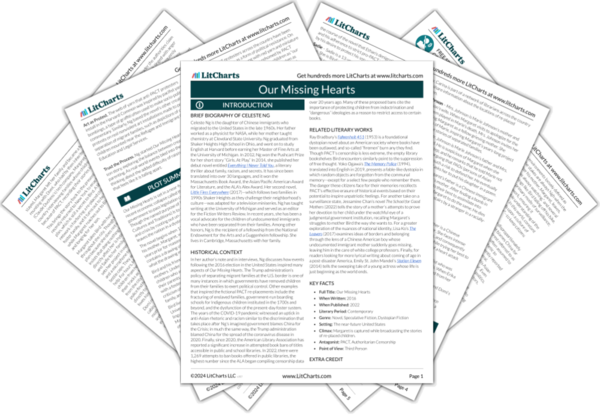Throughout Our Missing Hearts, certain characters are able to retreat from society’s problems into bubbles of comfort while others have no other option but to suffer through the economic instability and political unrest that has overtaken the novel’s imagined America. In this way, the novel illustrates how privilege allows some people to remain silent on issues that don’t directly affect them, which in turn makes them complicit in the oppression of others. During the Crisis, Domi criticizes Margaret for taking refuge with her new boyfriend Ethan, who comes from a wealthy, well-connected family. Later, however, Domi herself calls on the aid of her wealthy father and spends the remaining years of upheaval hiding out in an isolated cabin. Similarly, Margaret spends the early years of PACT in blissful ignorance of the negative impact it is having on families since the law does not directly affect her. After one of her poems becomes associated with the anti-PACT movement, however, she feels the full weight of her hypocrisy and her privilege—while she is touted as a leader of the resistance, in truth, she wasn’t even paying attention.
Domi and Margaret both spend the latter half of the novel trying to make up for the time they have spent in privileged silence. Domi donates to libraries and assists in tracking down the children PACT has removed, and Margaret collects the stories of families PACT has torn apart in an effort to atone for her earlier indifference. After reuniting with Bird, she experiences a momentary lapse in resolve, telling him she will abandon her planned protest now that she has him back in her life. In this moment, Bird realizes his mother’s hypocrisy, and he criticizes her for abandoning her protest of PACT once “it’s happening to someone else” instead of herself. Bird’s criticism of Margaret, which ultimately leads Margaret to acknowledge her hypocrisy and go through with her planned protest, emphasizes the importance of speaking out against oppression. Although the novel suggests that it is human and understandable to desire comfort and self-preservation in the face of widespread economic and political unrest, it also argues that people ought to use their privilege to fight on behalf of those who cannot.
Privilege, Silence, and Complicity ThemeTracker

Privilege, Silence, and Complicity Quotes in Our Missing Hearts
They don’t teach you any of this. Too unpatriotic, right, to tell you the horrible things our country’s done before. […] Because telling you what really happened would be espousing un-American views, and we certainly wouldn’t want that.
He notices how many, many American flags there are—on nearly every storefront, on the lapels of nearly every person he sees. […] Only when he’s left Chinatown, and the faces around him become Black and white instead of Asian, do the flags become more sporadic, the people here apparently more confident that their loyalty will be assumed.
Somewhere out there, you knew, wealthy people were barricaded in their fortresses, fed and warm, if not happy, but soon you stopped thinking of them. You stopped thinking about other people at all.
In the quiet of Ethan’s apartment, poems came to her like timid animals emerging after a storm.
She wrote about the hush of the city, how the pulse of it had changed, with so many people gone. About love, and pleasure, and comfort. The smell of his neck in the early morning. The warm soft den of their bed at night. About finding stillness in the whirr that had been there for so long, a quiet place in the grinding, never-ending shriek of the Crisis.
It was happening in other cities, in infinite variations: a kick or a punch on the sidewalk, a spray of spit in the face. It would happen everywhere, here and there at first, then all over, and eventually the news would stop reporting the stories, because they weren’t new anymore.
You think you know her? he went on. They all think they know her. Everybody thinks they know her, now. You got people wearing my little girl’s face on their chests, who don’t care about her or who she was. Just using her name to justify doing what they want. She’s nothing but a slogan to them. They don’t know the first thing about her. You don’t know the first thing about her either.
Sometimes it did turn out to be nothing. If you were well connected, if you showed the proper deference, or if perhaps you had a friend in the mayor’s office or the statehouse or, even better, the federal government, if in their background investigation it turned out you’d donated money to the right groups, or perhaps if you were willing to donate money right now—well then, perhaps you could make clear that you would never instill dangerous ideologies in your child.
All she wants is to not let him go.
None of this matters anymore, she says.
But even as she says it, she can see his face hardening, small embers in his gaze. How, she reads in his eyes, can you look away now that you know?
So it doesn’t matter, he says, as long as it’s happening to somebody else.











